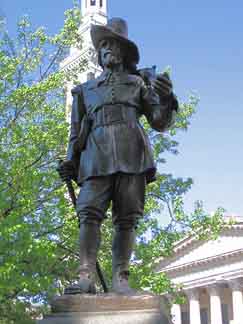colonial period
Overview
For the native peoples of the Americas, colonization constituted a grave threat to their traditional ways of life. The invasion of their lands by European settlers displaced established communities, and indigenous populations were decimated by disease and warfare. The contact between indigenous groups and European settlers began a period of profound cultural change for both the colonizers and the First Peoples.
On the outer edges of the Massachusetts Bay Colony was a settlement on the Connecticut River that was to become a center of commerce and industry. Founded by English entrepreneur and trader William Pynchon in 1636, the Springfield settlement, originally named Agawam Plantation, provided easy access to local waterways and quickly began to attract a growing population of European colonists.
Unlike many of the coastal colonial settlements, Springfield was comparatively relaxed in its social strictures. Indeed, this relative openness was a major draw for prospective settlers and led to a surprising degree of diversity in this colonial outpost. Here, one found not only English colonists but also Dutch, Scots, Irish, Welsh, and French inhabitants. Prominent households in the settlement even included former indentured servants from Africa.
Upon arrival in this "New World," the colonizers found thriving native populations that had inhabited the area for generations. Many colonists regarded the native peoples as an obstacle to the wealth in land and resources they so coveted. From their perspective, indigenous homelands were "frontiers" or "wilderness", their inhabitants too ignorant to exploit the lands' riches. Colonists dehumanized and demonized Indians as "savages," at the same time ennobling themselves as "civilized." Indigenous resistance to European domination erupted into warfare across New England in 1675-1676, and several key battles in what became known as King Philip's War took place in the Connecticut River Valley.
Colonizers viewed the settlements they established in places like Springfield as laying the foundation for future expansion, and indeed these attracted more and more immigrants which led to increasing conflicts with the First Peoples. It was from the clash of cultures and civilizations, however, that the beginnings of a new nation were formulated. While few celebrated diversity or practiced a tolerant pluralism during the colonial period, changing circumstances would open the way for a more inclusive society.
